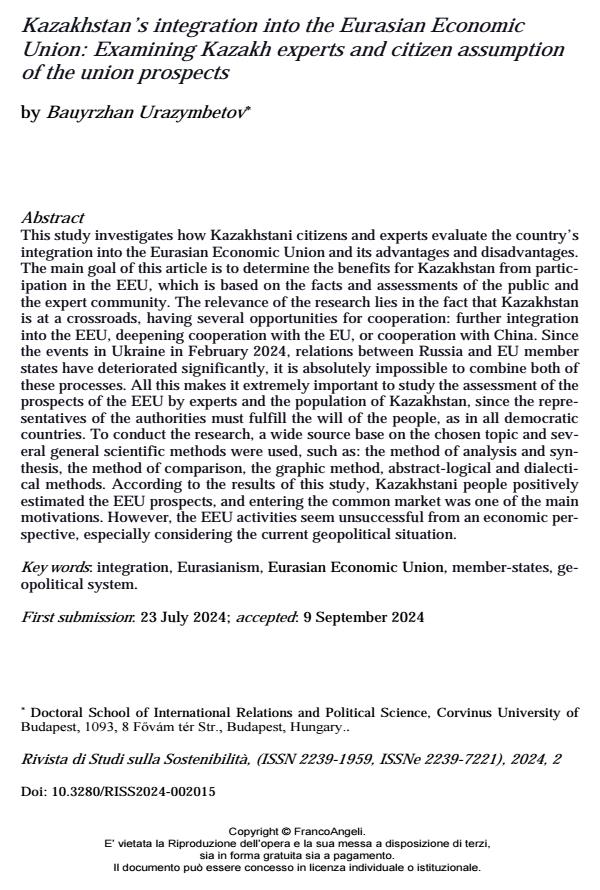Kazakhstan’s integration into the Eurasian Economic Union: Examining Kazakh experts and citizen assumption of the union prospects
Titolo Rivista RIVISTA DI STUDI SULLA SOSTENIBILITA'
Autori/Curatori Bauyrzhan Urazymbetov
Anno di pubblicazione 2024 Fascicolo 2024/2
Lingua Inglese Numero pagine 22 P. 255-276 Dimensione file 197 KB
DOI 10.3280/RISS2024-002015
Il DOI è il codice a barre della proprietà intellettuale: per saperne di più
clicca qui
Qui sotto puoi vedere in anteprima la prima pagina di questo articolo.
Se questo articolo ti interessa, lo puoi acquistare (e scaricare in formato pdf) seguendo le facili indicazioni per acquistare il download credit. Acquista Download Credits per scaricare questo Articolo in formato PDF

FrancoAngeli è membro della Publishers International Linking Association, Inc (PILA)associazione indipendente e non profit per facilitare (attraverso i servizi tecnologici implementati da CrossRef.org) l’accesso degli studiosi ai contenuti digitali nelle pubblicazioni professionali e scientifiche
This study investigates how Kazakhstani citizens and experts evaluate the coun-try’s integration into the Eurasian Economic Union and its advantages and disad-vantages. The main goal of this article is to determine the benefits for Kazakhstan from participation in the EEU, which is based on the facts and assessments of the public and the expert community. The relevance of the research lies in the fact that Kazakhstan is at a crossroads, having several opportunities for cooperation: further integration into the EEU, deepening cooperation with the EU, or coopera-tion with China. Since the events in Ukraine in February 2024, relations between Russia and EU member states have deteriorated significantly, it is absolutely im-possible to combine both of these processes. All this makes it extremely important to study the assessment of the prospects of the EEU by experts and the population of Kazakhstan, since the representatives of the authorities must fulfill the will of the people, as in all democratic countries. To conduct the research, a wide source base on the chosen topic and several general scientific methods were used, such as: the method of analysis and synthesis, the method of comparison, the graphic method, abstract-logical and dialectical methods. According to the results of this study, Kazakhstani people positively estimated the EEU prospects, and entering the common market was one of the main motivations. However, the EEU activi-ties seem unsuccessful from an economic perspective, especially considering the current geopolitical situation.
Parole chiave:integration, Eurasianism, Eurasian Economic Union, member-states, geopolitical system.
Bauyrzhan Urazymbetov, Kazakhstan’s integration into the Eurasian Economic Union: Examining Kazakh experts and citizen assumption of the union prospects in "RIVISTA DI STUDI SULLA SOSTENIBILITA'" 2/2024, pp 255-276, DOI: 10.3280/RISS2024-002015